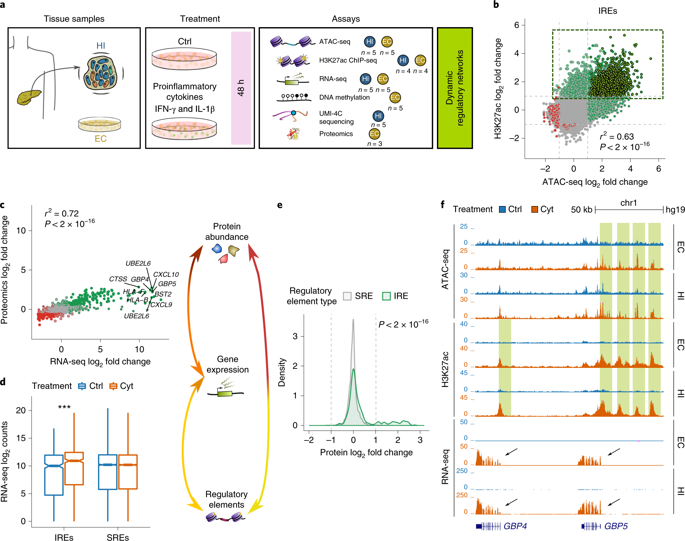当前位置:
X-MOL 学术
›
Nat. Genet.
›
论文详情
Our official English website, www.x-mol.net, welcomes your
feedback! (Note: you will need to create a separate account there.)
The impact of proinflammatory cytokines on the β-cell regulatory landscape provides insights into the genetics of type 1 diabetes.
Nature Genetics ( IF 31.7 ) Pub Date : 2019-11-01 , DOI: 10.1038/s41588-019-0524-6 Mireia Ramos-Rodríguez 1 , Helena Raurell-Vila 1 , Maikel L Colli 2 , Maria Inês Alvelos 2 , Marc Subirana-Granés 1 , Jonàs Juan-Mateu 2 , Richard Norris 1 , Jean-Valery Turatsinze 2 , Ernesto S Nakayasu 3 , Bobbie-Jo M Webb-Robertson 3 , Jamie R J Inshaw 4 , Piero Marchetti 5 , Lorenzo Piemonti 6 , Manel Esteller 7, 8, 9, 10 , John A Todd 4 , Thomas O Metz 3 , Décio L Eizirik 2 , Lorenzo Pasquali 1, 7, 11
Nature Genetics ( IF 31.7 ) Pub Date : 2019-11-01 , DOI: 10.1038/s41588-019-0524-6 Mireia Ramos-Rodríguez 1 , Helena Raurell-Vila 1 , Maikel L Colli 2 , Maria Inês Alvelos 2 , Marc Subirana-Granés 1 , Jonàs Juan-Mateu 2 , Richard Norris 1 , Jean-Valery Turatsinze 2 , Ernesto S Nakayasu 3 , Bobbie-Jo M Webb-Robertson 3 , Jamie R J Inshaw 4 , Piero Marchetti 5 , Lorenzo Piemonti 6 , Manel Esteller 7, 8, 9, 10 , John A Todd 4 , Thomas O Metz 3 , Décio L Eizirik 2 , Lorenzo Pasquali 1, 7, 11
Affiliation

|
The early stages of type 1 diabetes (T1D) are characterized by local autoimmune inflammation and progressive loss of insulin-producing pancreatic β cells. Here we show that exposure to proinflammatory cytokines reveals a marked plasticity of the β-cell regulatory landscape. We expand the repertoire of human islet regulatory elements by mapping stimulus-responsive enhancers linked to changes in the β-cell transcriptome, proteome and three-dimensional chromatin structure. Our data indicate that the β-cell response to cytokines is mediated by the induction of new regulatory regions as well as the activation of primed regulatory elements prebound by islet-specific transcription factors. We find that T1D-associated loci are enriched with newly mapped cis-regulatory regions and identify T1D-associated variants disrupting cytokine-responsive enhancer activity in human β cells. Our study illustrates how β cells respond to a proinflammatory environment and implicate a role for stimulus response islet enhancers in T1D.
中文翻译:

促炎细胞因子对 β 细胞调节环境的影响提供了对 1 型糖尿病遗传学的见解。
1 型糖尿病 (T1D) 的早期阶段以局部自身免疫性炎症和产生胰岛素的胰腺 β 细胞进行性丧失为特征。在这里,我们表明暴露于促炎细胞因子揭示了 β 细胞调节环境的显着可塑性。我们通过绘制与 β 细胞转录组、蛋白质组和三维染色质结构变化相关的刺激响应增强子来扩展人类胰岛调节元件的库。我们的数据表明 β 细胞对细胞因子的反应是由新调节区域的诱导以及由胰岛特异性转录因子预先结合的引发调节元件的激活介导的。我们发现 T1D 相关基因座富含新定位的顺式调节区域,并鉴定了 T1D 相关变体破坏了人类 β 细胞中细胞因子反应增强子的活性。我们的研究说明了 β 细胞如何对促炎环境作出反应,并暗示刺激反应胰岛增强剂在 T1D 中的作用。
更新日期:2019-11-01
中文翻译:

促炎细胞因子对 β 细胞调节环境的影响提供了对 1 型糖尿病遗传学的见解。
1 型糖尿病 (T1D) 的早期阶段以局部自身免疫性炎症和产生胰岛素的胰腺 β 细胞进行性丧失为特征。在这里,我们表明暴露于促炎细胞因子揭示了 β 细胞调节环境的显着可塑性。我们通过绘制与 β 细胞转录组、蛋白质组和三维染色质结构变化相关的刺激响应增强子来扩展人类胰岛调节元件的库。我们的数据表明 β 细胞对细胞因子的反应是由新调节区域的诱导以及由胰岛特异性转录因子预先结合的引发调节元件的激活介导的。我们发现 T1D 相关基因座富含新定位的顺式调节区域,并鉴定了 T1D 相关变体破坏了人类 β 细胞中细胞因子反应增强子的活性。我们的研究说明了 β 细胞如何对促炎环境作出反应,并暗示刺激反应胰岛增强剂在 T1D 中的作用。











































 京公网安备 11010802027423号
京公网安备 11010802027423号